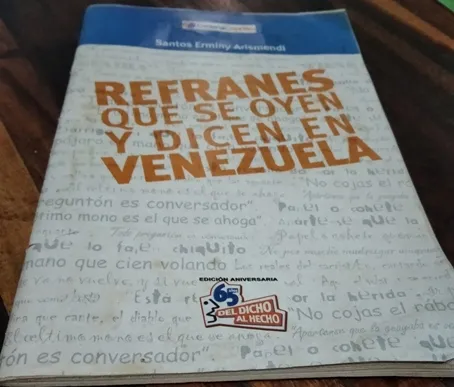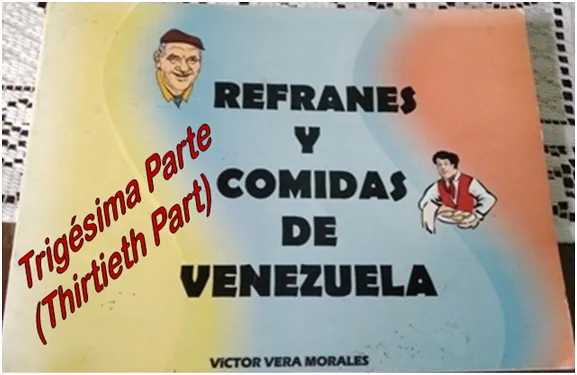

Es un refrán que evidencia la reciprocidad que debe prevalecer en las relaciones de las personas, es decir, si alguien pide o exige de forma constante, no está mal proceder de la misma manera con esa persona, pues no resultaría fuera de lugar o inadecuado.
Dicho que se parece mucho al anterior, y se emplea cuando una persona realiza alguna acción que pudiera considerarse abusiva o descortés, pero que al hacerla, realmente está siendo recíproca o retributiva, devolviendo a esa otra persona lo mismo que previamente ésta le hizo.
Las cabras son animales muy ruidosos y testarudos. Si se enlaza a una cabra y se le hala para que camine en una dirección, es muy probable que ésta se resista y que haga un alboroto. Al utilizar esta imagen en un refrán, lo que se trata de decir es que no se debe abusar de una situación o de alguien, ya que protestará o se quejará; por lo tanto, este dicho es un “gentil” llamado a no ser abusivos.
Este refrán hace alusión a las lluvias que se producen estando un arcoíris en el cielo, ya que muy pocas veces caerá, pues generalmente no llueve cuando esta hermosa figura aparece en el firmamento; pero si llega a llover, será muy abundante y copioso, pudiendo causar inundaciones. Al utilizar este refrán se hace un llamado de atención, a ser cautos y previsivos, ya que se pueden presentar dos opciones: La primera, es que la situación no merezca atención, tiempo ni energía. La segunda, que la misma situación sea un total y absoluto desastre; así que mejor evitar y/o prevenir.
Refrán que se emplea ante la ingratitud de alguien. También se usa para señalar el malagradecimiento, la inconformidad y poca valoración de la ayuda que le hemos brindamos o ha recibido alguna persona, pues esta no comprende o percibe el beneficio que ha obtenido, o simplemente no le parece importante por ser desagradecida.



It is a saying that shows the reciprocity that should prevail in people's relationships, that is, if someone constantly asks or demands, it is not wrong to proceed in the same way with that person, because it would not be out of place or inappropriate.
A saying that is very similar to the previous one, and is used when a person performs some action that could be considered abusive or discourteous, but in doing so, is actually being reciprocal or retributive, giving back to that other person the same thing that he or she previously did to him or her.
Goats are very noisy and stubborn animals. If you lasso a goat and pull it to walk in one direction, it is very likely to resist and make a fuss. By using this image in a saying, the point is that you should not abuse a situation or someone, as they will protest or complain; therefore, this saying is a "gentle" call not to be abusive.
This proverb alludes to the rains that occur when there is a rainbow in the sky, since it will rarely fall, since it usually does not rain when this beautiful figure appears in the sky; but if it does rain, it will be very abundant and copious, and may cause flooding. When using this proverb, it is a call of attention, to be cautious and foresighted, since two options can be presented: The first is that the situation does not deserve attention, time or energy. The second is that the situation itself may be a total and absolute disaster, so it is better to avoid and/or prevent.
A saying that is used in the face of someone's ingratitude. It is also used to indicate ungratefulness, inconformity and little appreciation of the help we have given or someone has received, because he/she does not understand or perceive the benefit he/she has obtained, or simply does not think it is important because he/she is ungrateful.

Dear readers, below I place the links of the first 27 posts, in case you want to read them:
Víctor Vera Morales. (Agosto 2004). Refranes y Comidas de Venezuela. Editado por el Instituto Municipal de Publicaciones de la Alcaldía de Caracas.
Santos Erminy Arismendi. (2006). Refranes que se oyen y dicen en Venezuela. Cadena Capriles, Caracas. Venezuela.
- Fotos de mi autoría, tomada con un teléfono REDMI 8A, intervenida con WordArt / Photos of my authorship, taken with a REDMI 8A telephone, intervened with WordArt.
- Los diseños incluidos en esta publicación, han sido elaborados por mi persona con la aplicación CANVA / The designs included in this publication has been made by me with the CANVA application.
In the event that it is required to use the content or images of this post and my other publications, I would be grateful if my authorship (Fabiola Martínez) was made and the corresponding link was cited. Thank you.


